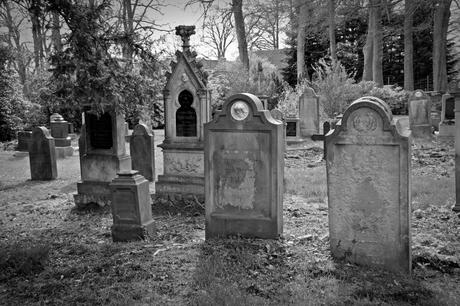Grace Thoughts
Calling The Dead – Part Two

For by grace you have been saved through faith, and that not of yourselves; it is the gift of God, not of works, lest anyone should boast. Ephesians 2:8-9
The ‘Walking’ Dead
One of the people who helped me investigate the truth claims of Christianity was (and still is) a Bible scholar. He shared with me that in the original language of the New Testament (Koine Greek) the meaning of Ephesians 2:8 is that the grace and faith were gifts from God and that neither came from the saved person. I could definitely see that salvation was because of God’s grace, but didn’t the faith to trust in Christ come from me? Not according to Paul: “and that not of yourselves; it is the gift of God, not of works, lest anyone should boast.” I was told the word “that” was in a grammatical construction that referred back to both “grace” and “faith.” The same for the word “it,” which refers back to the words grace and faith. It is “the gift of God.” It’s not of works, “lest anyone should boast.”
I thought about that for a long time. I was pretty convinced early on in my Christian life that I had played a vital role in my salvation by investigating the truth claims using journalistic skill. You can read some of my thought process about that in the last part of this study.
I certainly couldn’t boast if God did everything to save me, but wasn’t the choice to believe in the existence of God my choice? Wasn’t the choice to believe in the historical credibility of the Bible my choice? Wasn’t the choice to believe in the reality of the life, death and resurrection of Jesus Christ my choice? Wasn’t the choice to place my faith and trust in Christ for eternal life my choice?
The man who I say led me to Christ asked me if I could think of any reason why I shouldn’t receive Christ as my Lord and Savior. I had been investigating Christian truth claims for months and had come across a ton of reasons to believe Christianity was true. I said I couldn’t think of any reason not to believe, so he told me to tell God what was on my heart and mind. I told God I believed He existed, that His Word was true and that Jesus Christ had died for my sins and risen from the dead. I asked God to forgive me of my sins and save me.
God did everything to prepare the way for my salvation through prevenient grace and by sending His Son to die for my sins and rise from the dead, but didn’t I fill in the last part of my salvation by believing what God had done for me? Wasn’t my belief (faith) the final piece that finished my salvation? Isn’t that what it means to be on the porch with an activated mind and free will and choose whether to enter through the door of justification? (See previous study)
Then I remembered what Paul wrote. I was “dead” in trespasses and sins. How could a spiritually dead man (a corpse – nekros) respond to what Jesus had done on the Cross? How could a truly dead man know or understand what Jesus had accomplished on the Cross or that what Jesus had done was what the dead man needed to come to life spiritually?
I was still confused. Maybe God’s grace activated my mind and heart and gave me enough life to consider the Gospel and come to my own conclusion about whether I believed it or not. Maybe I had been seriously wounded spiritually, but wasn’t really dead. Maybe just close to death? Paul did write that humans who were dead in trespasses and sins once “walked according to the course of this world” and “once conducted” themselves in the lusts of the flesh. That meant people were alive physically and mentally. Why couldn’t “dead in trespasses and sins” mean mortally wounded or near death?
The problem was that Paul didn’t write that. He wrote – και υμας οντας νεκρους τοις παραπτωμασιν και ταις αμαρτιαις – “and you being dead in the trespasses and in the sins of you.” If Paul had only written it differently, but he didn’t. Paul wrote under the inspiration of the Holy Spirit and that’s how the Spirit wanted Paul to write it. Though people were physically alive, they were spiritually dead (nekros – corpse, dead). They were in fact the ‘walking dead’ spiritually.
Grace, Grace, God’s Grace
One of my favorite hymns is “Grace Greater Than Our Sin” by Julia Johnston. She wrote this more than a hundred years ago:
Marvelous grace of our loving Lord, Grace that exceeds our sin and our guilt! Yonder on Calvary’s mount outpoured, There where the blood of the Lamb was spilled. Grace, grace, God’s grace, Grace that will pardon and cleanse within; Grace, grace, God’s grace, Grace that is greater than all our sin!
I mentioned in the first part of this series that there are different views of prevenient grace (grace that “goes before, precedes”). The view we looked at before is that the gift of grace is available to everyone. Matthew 18:14 and 1 Timothy 2:4 are quoted to support that view about grace.
I also learned as a young Christian that there are different types of grace. They include:
- Prevenient or preventing grace — this refers to the “first dawning of grace in the soul.” We receive prevenient grace before we are able to respond to God. The preventing grace gives everyone the ability to respond to the continuing work of God’s grace.
- Convincing grace — this refers to the grace that leads us toward repentance. It’s the grace that awakens in a person the desire to “flee the wrath to come.”
- Justifying grace — this refers to the grace that works by faith reconcile a person to God through the atoning work of Jesus Christ on the Cross. This is the grace that pardons our sin.
- Sanctifying grace — this refers to the grace that begins at our spiritual rebirth (being born again) and continues throughout our life as we respond positively to the Holy Spirit. We experience the “fruit of the Spirit” and achieve holiness in this lifetime.
This was how I understood salvation and spiritual growth as a young Christian. However, I also heard different views.
Back to the Beginning
So, I went back to the beginning of the Bible to better understand how God had saved people in the past. Maybe I would find an answer to my questions there. That’s where my investigation into God’s existence and the historical reliability of the Bible had started, so it seemed like a good place to revisit.
I looked at the physical and spiritual lives of people like Adam and Eve, Cain and Abel, Seth and Enosh, Noah, Shem, Nimrod, Abraham, Isaac, Jacob, Moses, David, Solomon, the prophets, the apostles and many others, and found the same thing. God did everything for them spiritually. They were all dead spiritually – dead in trespasses and sins. None of them did good. None of them were righteous. None of them understood. None of them sought after God. Just like Paul wrote in Romans 3.
As it is written: There is none righteous, no, not one; There is none who understands; There is none who seeks after God. They have all turned aside; They have together become unprofitable; There is none who does good, no, not one. Romans 3:10-12
Noah found grace in the eyes of the Lord (Genesis 6:8) and God saved him and his family from the Flood that killed every other human on earth. Noah was dead in trespasses and sins. God called a dead man to follow Him. Noah followed.
Abram was a pagan, worshipping idols, serving other gods (Joshua 24:2). Abram was dead in trespasses and sins. God called a dead man to follow Him. Abram followed.
Moses was a murderer on the run. Moses was dead in trespasses and sins. God called a dead man to follow Him. Moses followed.
David was a shepherd boy who didn’t seem to matter much to his family. David was dead in trespasses and sins. God called a dead boy to follow Him. David followed.
The same was true with every other person in the Bible (except for Jesus, of course). What I found throughout the Bible was God calling spiritually dead people to become spiritually alive. Did those dead people God called to life have anything about which to boast? They didn’t.
In the context of Romans 3:9-18, Paul wrote this:
Where is boasting then? It is excluded. By what law? Of works? No, but by the law of faith. Therefore we conclude that a man is justified by faith apart from the deeds of the law. Romans 3:27-28
What about Abraham? Certainly of all people in the Bible Abraham could boast at least a little about his works. Right?
For if Abraham was justified by works, he has something to boast about, but not before God. Romans 4:2
But wasn’t Abraham justified by faith? Read Romans 4:3 and it seems pretty clear that God saved Abraham because of his faith.
Abraham believed God, and it was accounted to him for righteousness.
I found myself back to the same question. How does a spiritually dead person believe God? If Abraham was dead in trespasses and sins, if “all have sinned and fall short of the glory of God” (Romans 3:23), if there is “none who understands; There is none who seeks after God” (Romans 3:11), how could Abraham believe God?
If no one understands, if everyone is dead in trespasses and sins, if everyone is under the wrath of God, how then can God save anyone? Yes, it’s because He is loving, gracious and merciful, but how can He save someone who can’t respond to His call because they are dead? Aren’t we back to the need for prevenient grace?
I continued to study and struggle to get an answer to my question. It seemed important to me at the time and still does.
Next Time
Part of going back to the beginning was remembering that salvation is something God does. Who is God? What do we know about God that might give us some insight into how His salvation would be consistent with His nature and character?
We’ll do our best to answer that question in the next part of our special study, Calling The Dead.
Scripture taken from the New King James Version®. Copyright © 1982 by Thomas Nelson. Used by permission. All rights reserved.
GraceLife © 1990-2022
 GodGod's WordHoly SpiritJesus ChristSin and Salvation
GodGod's WordHoly SpiritJesus ChristSin and Salvation

Published by gracelifethoughts
Founder & Director of GraceLife Ministries View all posts by gracelifethoughts
